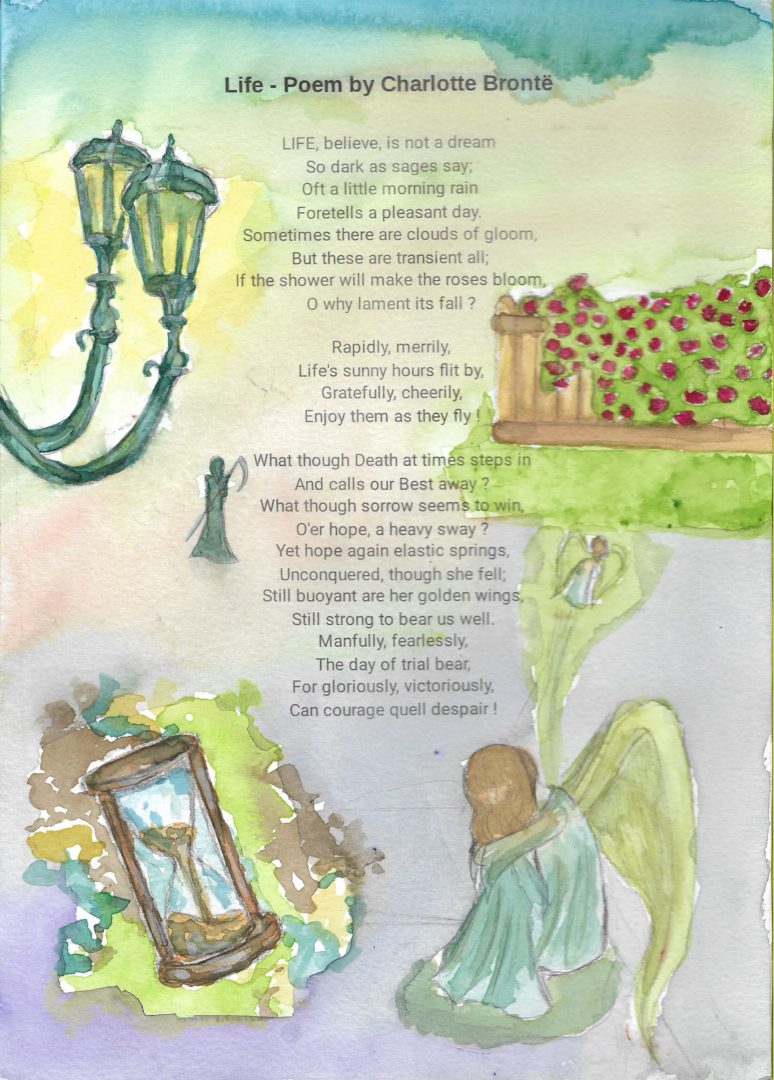In Life, Charlotte Brontë puts forth man’s never-ending discontent for life’s downs in three wholesome, imagery-packed stanzas. She focuses on (mainly) three, intertwining ideas throughout her poem: the first being that the hardships we face are temporary and result in better things, the second revolving around our attitudes in the short lives we live and the third emphasising our mindsets- especially when it comes to hope, or lack thereof.
Immediately, our attention is hers as she starts off in an all-caps word, “LIFE”. Addressing us, she compels us to “believe” that, as she says, life “is not a dream”. Her urgent tone and clarification of an already common sense truth lead us to think that perhaps she has been through hard times that have shown her how nightmarish things can get. However, this doesn’t stop her from her consolations that “a little morning rain foretells a pleasant day”. Reaching out to those in immense pain, she expands on this by reassuring that the “clouds of gloom” are but passing tribulations that will soon be over. Nevertheless, she observes that what started as a feeble “morning rain” can end up as raging “showers” then sheds light that they “will make the roses bloom” thus mourning them is futile. But what does all this mean? Well, in all simplicity, the journey of life can at times be a rocky one- but there’s no point in crying over the things that don’t go our way because there are better things ahead, things that are probably better than what we originally aimed for anyway. Hardships have a knack of turning people into better versions of themselves, like gold through fire; it comes out of the harsh furnace pure and magnificent, fit for use.
Next, we are faced with the fleeting qualities of time. “Rapidly, merrily, life’s sunny hours flit by,” – does this not ring a bell? Almost every conversation about time with an older person sounds more or less the same. Nobody seems to know ‘just where the time went’, which brings us to the conclusion that these “flying hours” must be used wisely and be filled with productivity and enjoyment. Not only does she highlight that, but also the importance of doing so “gratefully”! How many times have we complained about our own cushy life or moaned that a minor luxury didn’t go precisely how we wanted it to? Is this not a sin- to constantly grumble, our eyes and reaching hands always yearning for more, never satisfied with the abundance of riches and grace we are sat on? Brontë here wishes to shake us back into consciousness so that our eyes are opened to see the bountiful joys of life and the beauty in everything- leading to a far more fulfilling life.
Nevertheless, life is not all sunshine and rainbows: there are times where we will find ourselves seriously hurt, so deep that our world is viewed through black-tinted lenses. Sometimes we fall into self-destructive thoughts and get caught up in the never-ending downwards spiral that is negativity; perhaps a loved one passed away, as referenced by the poet at the start of the third stanza. “What though Death… calls our Best away? What though sorrow seems to win o’er hope…?” She acknowledges these moments of inner weakness and hopelessness; every now and then, we may look down at our situation and utter that we have hit ‘rock bottom’ and that there’s no going up. And that’s exactly the state being mentioned here. Yet instead of lyrical lines expressing self-pity and grief, readers stumble upon a rigid transition between emotions. It’s as if Charlotte Brontë wants to cut short these mundane rituals and jump straight to the constructive part of falling down: getting up. “Yet hope again elastic springs, Unconquered, though she fell”. All this means is that hope is never lost. Hope is personified as a winged being- an angel, I imagine- with “buoyant, golden wings” to float over the heavy waters of aggravation, lifting the despaired up to wellness. Shall we not fear the “day of trial”? Hardships are temporary and will be conquered, “gloriously, victoriously” and with “courage”.
Let us all stand strong against our own giant mountains of fears and doubts for hope remains “unconquered” only if you allow it to.


